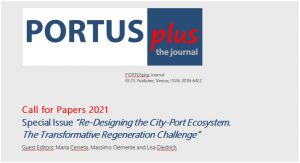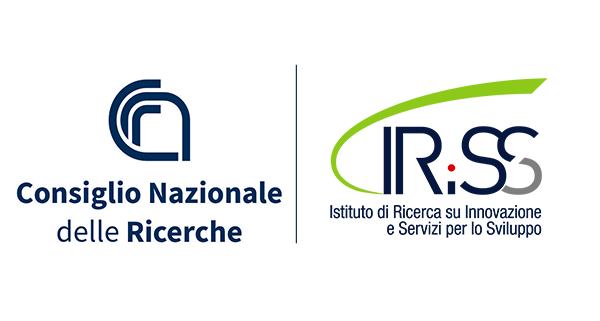PORTUSplus Call for Papers 2021 | Special Issue: Re-Designing the City-Port Ecosystem. The Transformative Regeneration Challenge. Deadline: 31 July 2021.
 Promoting the communication and development of scientific research, that plays an increasingly relevant role in our society, PORTUSplus invites scholars and researchers, experts and professionals to respond to the Call for Papers Special Issue “Re-Designing the City-Port Ecosystem. The Transformative Regeneration Challenge”.
Promoting the communication and development of scientific research, that plays an increasingly relevant role in our society, PORTUSplus invites scholars and researchers, experts and professionals to respond to the Call for Papers Special Issue “Re-Designing the City-Port Ecosystem. The Transformative Regeneration Challenge”.
This special issue investigates the transformative capacity of regeneration efforts that re-design the city-port ecosystem, from the global to the local scale. Can they promote innovative models of resource enhancement and new systems of multi-scale relationships between city and port?
The regeneration of the city-port ecosystem needs multi-dimensional approaches to identify and re-design opportunities for change and innovation at different scales, including the local and regional level, and considering territory, landscape, infrastructure, architecture, services and products.
According to Circular Economic principles, the transformative capacity of the city-port offers a crucial lever for the re-design of regeneration approaches, reconfiguring urban, social, ecological and technological systems.
In particular, among new approaches and tools, the “7 Rs” of the Circular Economy model could support the re-design of the city-port ecosystem and identify the main fields of reflection, exploring different aspects and components of transformative capacity. This special issue welcomes theoretical and empirical contributions that aim to provide deeper insight into all aspects of:
- rethinking the models of innovative governance at different levels of territorial scales, with attention to co-planning and co-design processes able to promote transformative capacity and local action for city-port sustainability;
- reducing the consumption of energy, materials and resources by applying sustainable design principles and new smart and green technologies for port infrastructure and services;
- reusing existing resources, with particular attention to the protection of the maritime space, enhancement of the coastline and the urban fabric, and waterfront regeneration;
- repairing the components and the fabric of the city-port interface according to an ecosystem vision of the port-city relationship where the architectural project can play a driving role;
- renewing abandoned, degraded, or underused ports, identifying new territorial attractive capacities in the re-design of the spaces and forms of the city-port system, based on place branding of the city-port community and the enhancement of local cultural identities;
- recovering the waste landscapes of the city-port, with attention also to the re-design of waterfronts and interface spaces, through processes of circular urban and territorial metabolism;
- recycling the different kinds of resources for sustainable land and sea management in ports and coastal areas, supported by integrated and open innovation approaches and tools.
This special issue is edited Maria Cerreta, Associate Professor of Environmental Assessment and Evaluation at the Department of Architecture (DiARC) of the University of Naples Federico II, Associate to CNR IRISS and member of the Scientific Committee of RETE; Massimo Clemente, Director of CNR IRISS and Scientific Director of RETE, and Lisa Diedrich, Prof. of Landscape Architecture, Planning and Management at the Swedish University of Agricultural Sciences, Director of the Research Platform SLU Urban Futures, member of RETE Scientific Committee.
The deadline for the submission of papers is July 31, 2021.
PORTUSplus is an international, double blind peer-reviewed, open-access journal promoted by RETE – Association for the Collaboration between Ports and Cities. Its purpose is to promote the collection and dissemination of original scientific products with interdisciplinary nature, expanding and organizing information and studies focusing on topics related to the multiple dynamics of the contemporary port cities and urban waterfronts.
More info:


 Promoting the communication and development of scientific research, that plays an increasingly relevant role in our society,
Promoting the communication and development of scientific research, that plays an increasingly relevant role in our society, 
You must be logged in to post a comment.